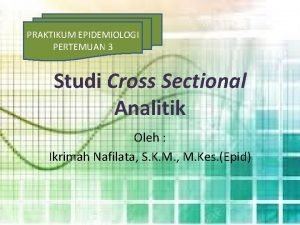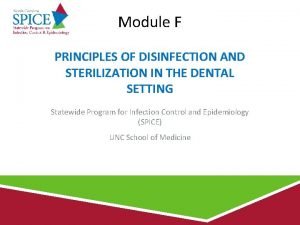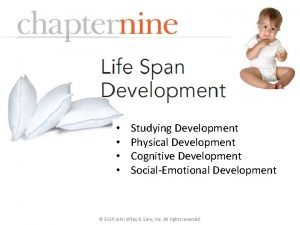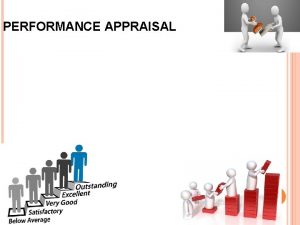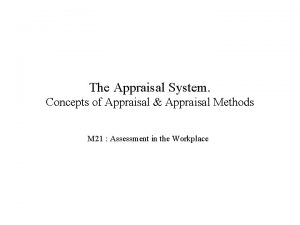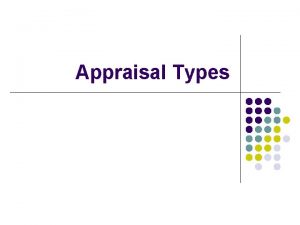AXIS critical Appraisal of cross sectional Studies Dr














- Slides: 14

AXIS critical Appraisal of cross sectional Studies Dr. Martin Downes @mjdepi

Critical appraisal Systematic evaluation of clinical research to examine • Trustworthiness. – Valid methods and reporting – Clear question addressed • Value. – Are the results important • Relevance. – applicable population, clinical setting, etc.

Critical appraisal - background • Central to undertaking evidence based practice which is concerned with – Integrating the best external evidence with clinical care. – Central role in the interpretation and dissemination of research for evidence based practice. – Helps understanding the outcomes of research publication Griffith School of Medicine 3

Evidence Gap • A number of well developed appraisal tools assessing the quality of intervention observation studies; including cohort and case control studies, • Lack of an appraisal tool specifically aimed at cross sectional studies.

Aim • The aim of this study was to develop a critical appraisal tool that addressed study design quality and risk of bias in cross sectional studies. • With an accompanying easy to use explanatory document – help enhance knowledge and – impart skills required to conduct a critical appraisal

Methods • Broad areas were identified • Using a scoping review and key epidemiological texts. • Tested and further developed before Delphi • Examined and further developed using a Delphi process.

Delphi study Rome did not create a great empire by having meetings, they did it by killing all those who opposed them

Methods • The contents were agreed on based on 80% consensus

Results • • Started with > 30 areas of interest 18 recruited for Delphi panel 3 rounds of consensus were carried Ended with a 20 item questionaire

Results • The Appraisal tool for Cross-Sectional Studies (AXIS) was developed – 20 point questionnaire that addressed study quality and reporting. – Key areas addressed in the AXIS include – Study Design, Sample Size Justification, Target Population, Sampling Frame, Sample Selection, Measurement Validity & Reliability, and Overall Methods.

Question Yes No Com Was the study design appropriate for the stated aim(s)? Was the sample size justified? Was the target/reference population clearly defined? (Is it clear who the research was about? ) Was the sample frame taken from an appropriate population base so that it closely represented the target/reference population under investigation? Was the selection process likely to select subjects/participants that were representative of the target/reference population under investigation? Were measures undertaken to address and categorise non-responders? Were the risk factor and outcome variables measured appropriate to the aims of the study? Were the risk factor and outcome variables measured correctly using instruments/measurements that had been trialled, piloted or published previously? Is it clear what was used to determined statistical significance and/or precision estimates? (e. g. p-values, confidence intervals) Were the methods (including statistical methods) sufficiently described to enable them to be repeated? Introduction 1 Were the aims/objectives of the study clear? Methods 2 3 4 5 6 7 8 9 10 11 Results 12 13 14 15 16 Were the basic data adequately described? Does the response rate raise concerns about non-response bias? If appropriate, was information about non-responders described? Were the results internally consistent? Were the results presented for all the analyses described in the methods? Discussion 17 18 Were the authors' discussions and conclusions justified by the results? Were the limitations of the study discussed? Other 19 Were there any funding sources or conflicts of interest that may affect the authors’ interpretation of the results?

Question Yes No Com Was the study design appropriate for the stated aim(s)? Was the sample size justified? Was the target/reference population clearly defined? (Is it clear who the research was about? ) Was the sample frame taken from an appropriate population base so that it closely represented the target/reference population under investigation? Was the selection process likely to select subjects/participants that were representative of the target/reference population under investigation? Were measures undertaken to address and categorise non-responders? Were the risk factor and outcome variables measured appropriate to the aims of the study? Were the risk factor and outcome variables measured correctly using instruments/measurements that had been trialled, piloted or published previously? Is it clear what was used to determined statistical significance and/or precision estimates? (e. g. p-values, confidence intervals) Were the methods (including statistical methods) sufficiently described to enable them to be repeated? Introduction 1 Were the aims/objectives of the study clear? Methods 2 3 4 5 6 7 8 9 10 11 Results 12 13 14 15 16 Were the basic data adequately described? Does the response rate raise concerns about non-response bias? If appropriate, was information about non-responders described? Were the results internally consistent? Were the results presented for all the analyses described in the methods? Discussion 17 18 Were the authors' discussions and conclusions justified by the results? Were the limitations of the study discussed? Other 19 Were there any funding sources or conflicts of interest that may affect the authors’ interpretation of the results?

• Detailed explanatory document provided with the tool • Expanded explanation of each question • The AXIS tool is intended to be an organic item that can change and improve where required, based on user feedback. • In use by a number of researchers

@mjdepi
 Axis tool for cross sectional studies
Axis tool for cross sectional studies Pengertian studi cross sectional
Pengertian studi cross sectional Cross-sectional studies
Cross-sectional studies Critical semi critical and non critical instruments
Critical semi critical and non critical instruments Semi critical instruments in dentistry
Semi critical instruments in dentistry Impedence method
Impedence method A six pole ,60 hz synchoronous machine
A six pole ,60 hz synchoronous machine Axis 1 and axis 2 disorders
Axis 1 and axis 2 disorders Hyperbola conjugate axis
Hyperbola conjugate axis Transverse axis vs conjugate axis
Transverse axis vs conjugate axis Axis 1 and axis 2 disorders
Axis 1 and axis 2 disorders What is the volume of the prism below
What is the volume of the prism below Longitudinal vs cross sectional
Longitudinal vs cross sectional Cross sectional research design example
Cross sectional research design example Removed section view
Removed section view

